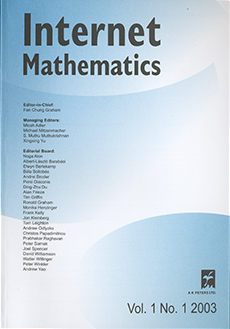Abstract
Social networks are the substrate upon which we make and evaluate many of our daily decisions: our costs and benefits depend on whether—or how many of, or which of—our friends are willing to go to that restaurant, choose that cellular provider, already own that gaming platform. Much of the research on the “diffusion of innovation,” for example, takes a game-theoretic perspective on strategic decisions made by people embedded in a social context. Indeed, multiplayer games played on social networks, where the network's nodes correspond to the game's players, have proven to be fruitful models of many natural scenarios involving strategic interaction. In this paper, we embark on a mathematical and general exploration of the relationship between two-person strategic interactions (a “base game”) and a “networked” version of that same game. We formulate a generic mechanism for superimposing a symmetric two-player base game M on a social network G: each node of G chooses a single strategy from M and simultaneously plays that strategy against each of its neighbors in G, receiving as its payoff the sum of the payoffs from playing M against each neighbor. We denote the networked game that results by M⊕G. We are broadly interested in the relationship between properties of M and of M⊕G: how does the character of strategic interaction change when it is embedded in a social network? We focus on two particular properties: the (pure) price of anarchy and the existence of pure Nash equilibria. We show tight results on the relationship between the price of anarchy in M and M⊕G in coordination games. We also show that, with some exceptions when G is bipartite, the existence or absence of pure Nash equilibria (and even the guaranteed convergence of best-response dynamics) in M and M⊕G is not entailed in either direction. Taken together, these results suggest that the process of superimposing M on a graph is a nontrivial operation that can have rich, but bounded, effects on the strategic environment.
Citation
Joshua R. Davis. Zachary Goldman. Elizabeth N. Koch. Jacob Hilty. David Liben-Nowell. Alexa Sharp. Tom Wexler. Emma Zhou. "Equilibria and Efficiency Loss in Games on Networks." Internet Math. 7 (3) 178 - 205, 2011.




